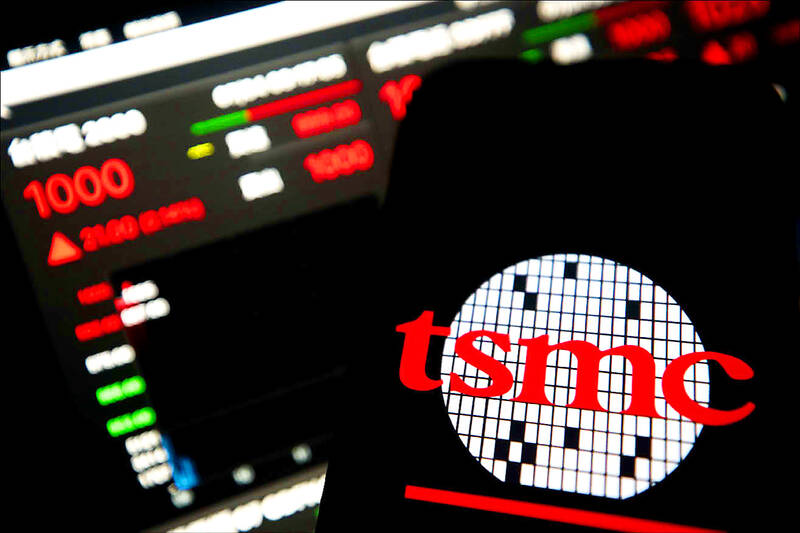Taiwan Semiconductor Manufacturing Co (TSMC, 台積電) shares rose 2.66 percent to close at a record high of NT$1,005 yesterday. as investors expect the company to continue benefiting from strong demand for artificial intelligence (AI) and high-performance computing (HPC) chips.
TSMC is the 19th member of the local bourse’s NT$1,000 stock club, which includes smartphone chip designer MediaTek Inc (聯發科) and electric transformer manufacturer Fortune Electric Co (華城電機).
Yesterday’s rally swelled TSMC’s market capitalization to NT$26.06 trillion (US$802.3 billion) and contributed about 211 points to the TAIEX, which closed up 350.1 points, or 1.51 percent, to 23,522.53, another record high, Taiwan Stock Exchange data showed.

Photo: CNA
TSMC has this year surged 69.48 percent, making it the most valuable stock on the local bourse and the world’s No. 10 company in terms of market capitalization.
The market expects TSMC to issue a positive report during its upcoming earnings conference, which helped boost the company’s share price to a record high yesterday, Mega International Investment Trust Co (兆豐國際投顧) analyst Alex Huang (黃國偉) said.
The chipmaker’s subsequent performance would continue to affect the trajectory of Taiwan’s stock market, Huang added.
While TSMC’s cutting-edge technology and valuation are making it a favorite play among global investors, the company has also benefited from being the main advanced-chip supplier of Nvidia Corp.
TSMC is expected to guide for a quarterly revenue growth of more than 10 percent for the next quarter at its earnings conference on July 18, thanks to stronger-than-expected demand for advanced chips amid the AI boom, analysts have said.
The company is also forecast to increase capital spending next year to between US$32 billion and US$36 billion, compared with this year’s US$28 billion to US$32 billion, analysts said.
UBS Group AG this week raised its full-year capital expenditure estimates for TSMC to US$32 billion this year and US$37 billion next year, citing increasing demand from generative AI and recovering margins on the back of cutting-edge technology.
TSMC in April told investors that this year would be a “healthy growth year” for the chipmaker, supported by its technology leadership and a broad customer base.
Revenue would expand by a low to mid-20 percent year-on-year this year, with the second half to outperform the first half, it said.
Additional reporting by CNA and Bloomberg

Hon Hai Precision Industry Co (鴻海精密) yesterday said that its research institute has launched its first advanced artificial intelligence (AI) large language model (LLM) using traditional Chinese, with technology assistance from Nvidia Corp. Hon Hai, also known as Foxconn Technology Group (富士康科技集團), said the LLM, FoxBrain, is expected to improve its data analysis capabilities for smart manufacturing, and electric vehicle and smart city development. An LLM is a type of AI trained on vast amounts of text data and uses deep learning techniques, particularly neural networks, to process and generate language. They are essential for building and improving AI-powered servers. Nvidia provided assistance

GREAT SUCCESS: Republican Senator Todd Young expressed surprise at Trump’s comments and said he expects the administration to keep the program running US lawmakers who helped secure billions of dollars in subsidies for domestic semiconductor manufacturing rejected US President Donald Trump’s call to revoke the 2022 CHIPS and Science Act, signaling that any repeal effort in the US Congress would fall short. US Senate Minority Leader Chuck Schumer, who negotiated the law, on Wednesday said that Trump’s demand would fail, while a top Republican proponent, US Senator Todd Young, expressed surprise at the president’s comments and said he expects the administration to keep the program running. The CHIPS Act is “essential for America leading the world in tech, leading the world in AI [artificial

DOMESTIC SUPPLY: The probe comes as Donald Trump has called for the repeal of the US$52.7 billion CHIPS and Science Act, which the US Congress passed in 2022 The Office of the US Trade Representative is to hold a hearing tomorrow into older Chinese-made “legacy” semiconductors that could heap more US tariffs on chips from China that power everyday goods from cars to washing machines to telecoms equipment. The probe, which began during former US president Joe Biden’s tenure in December last year, aims to protect US and other semiconductor producers from China’s massive state-driven buildup of domestic chip supply. A 50 percent US tariff on Chinese semiconductors began on Jan. 1. Legacy chips use older manufacturing processes introduced more than a decade ago and are often far simpler than

Gasoline and diesel prices this week are to decrease NT$0.5 and NT$1 per liter respectively as international crude prices continued to fall last week, CPC Corp, Taiwan (CPC, 台灣中油) and Formosa Petrochemical Corp (台塑石化) said yesterday. Effective today, gasoline prices at CPC and Formosa stations are to decrease to NT$29.2, NT$30.7 and NT$32.7 per liter for 92, 95 and 98-octane unleaded gasoline respectively, while premium diesel is to cost NT$27.9 per liter at CPC stations and NT$27.7 at Formosa pumps, the companies said in separate statements. Global crude oil prices dropped last week after the eight OPEC+ members said they would